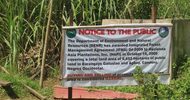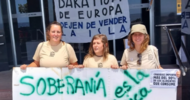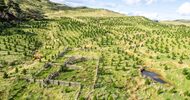"Baladna (a Qatari company) is willing to help us in the free nutritious meal programme by investing in dairy farming in Indonesia to meet our milk needs," says Agriculture Minister Andi Amran Sulaiman.
- Bernama
-
11 September 2024
The Ministry is engaging with private investors and international partners. Recent discussions include an investor from the Middle East seeking 20,000 hectares and interest from China and Vietnam for a minimum of 5,000 hectares.
- Jakarta Globe
-
23 August 2024
A state-owned palm oil company and an industry association have begun early work to push a vast new plantation strategy in Sulawesi, one of Indonesia’s largest islands. The proposal includes aspirations for production of a form of environmentally friendly fertilizer hope that it will enable producers to apply for climate finance incentives, despite the deforestation implied in the plan.
Since 2010, the unpleasant experience, pain and suffering from the Merauke Integrated Food and Energy Estate program have not ceased and have continued to pile up
- Pusaka & LBH
-
30 July 2024
Allegations of illegal activity and land-grabbing against Indonesia’s second-largest palm oil company continue to mount as a new report reveals the firm’s violations appear to be more extensive than initially documented.
Cerca de 18.000 hectáreas de concesiones de aceite de palma de AAL se superponen con tierras forestales de áreas protegidas de Indonesia, afirma el informe de FOE. Diez marcas han suspendido las compras a AAL, mientras Unilever y Olam son compradores y BlackRock poseía el 11 por ciento del grupo.
Indonesia is going ahead with a project to convert millions of acres in Papua into a gigantic sugarcane plantation to produce bioethanol. But Indigenous communities and environmentalists worry that the project in South Papua’s Merauke regency will lead to land grabs, ecological damage, and the destruction of traditional livelihoods.
Representatives of the Awyu and Moi communities from the Indonesian province of West Papua held traditional ceremonies outside the country’s Supreme Court calling for their traditional land and forests to be protected from palm oil plantations. The Awyu have also intervened in appeals taken by two other palm oil companies against a decision to cancel permits that it had previously issued for them to clear Indigenous lands.
Food estate yang sudah dan akan dikerjakan di beberapa wilayah Indonesia seolah menjanjikan ketersediaan pangan berkelanjutan dan meningkatkan ketahanan pangan nasional. Namun, di balik semua janji manis, banyak sisi gelap perlu dipertimbangkan secara serius. Semua kajian memperlihatkan ”food estate” lebih banyak membawa kerugian, bahkan kekerasan, terhadap masyarakat.
The Government approved Decree 15 of 2024 signed by President Joko Widodo on April 19 to form a task force for the acceleration of sugar and bioethanol self-sufficiency stationed in Merauke district, South Papua province.
Indonesia's Agriculture Minister Andi Amran Sulaiman and the South Papua provincial government launched 500 thousand hectares of rice fields in the region to increase agricultural production, both regionally and nationally.
Palm oil companies in Indonesia, the world’s top producer of the commodity, cleared 30,000 ha of forest last year to make way for plantations. France-based TheTreeMap used plantation concession data from Greenpeace to identify 53 companies behind the plantation expansion and resulting deforestation, of which 20 had cleared carbon-rich peatlands.
















